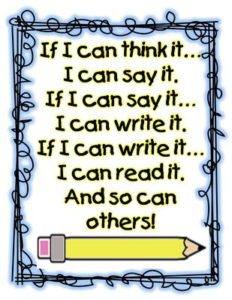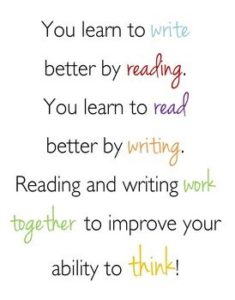I’m on the “Write” Road Now
As a future teacher of writing, my goal is to create a classroom environment conducive to placing first-year students on a path of self-discovery. Students will locate themselves within the range of voices encountered during classroom lessons as they prepare to function and participate outside the classroom as informed citizens of the world. Students will learn, as I did from studying threshold concept 3, that writing creates identities and ideologies.
I believe that to engage students as learners in the writing process, I, too, must be a lifelong learner to assess and address students’ diverse literacy experiences and interests. It is my objective to meet students where they are individually and engage each of them to achieve a common level of literacy skill development. I’m persuaded once students become accustomed to an open, positive, safe, supportive environment, they will authentically connect and collaborate among themselves and with me. We will operate cohesively as a class to apply threshold concept 4 that all writers have more to learn because I’m inspired by the “imperfectability” of writing. My blog post, of September 16, 2018, titled “Writing is Perpetual Learning” presents my perspective on the concept.
I’m convinced my collaboration with students will enhance their learning experience. Collaborative effort of students and teachers bridges the digital divide brought on by pervasiveness of digital technology. My conviction has its basis in NCTE Position Statements on the issue as referenced in my blog post, dated October 1, 2018, titled “Observations on WPA Outcomes Statement and NCTE Position Statements” with my assertion: “There’s no escaping the need for teachers of writing to  keep in step with digital and technological advances.”
keep in step with digital and technological advances.”
The ubiquitous aspect of digital technology affords me the opportunity of directing students to websites, YouTube videos, and other online resources that will assist them with incorporating multimodality into their writing. Multimodal components are pertinent because all writing is multimodal, according to threshold concept 2.4. With this approach, students will avail themselves to the most current digital resources and tutorials rather than have me provide tools that may be obsolete. I have learned it is much more relevant to offer lenses to students rather than give tools because tools are subject to change. I believe this collaborative effort is effective to student learning and developing critical thinking skills.
 I will promote collaboration among students throughout the term using peer review and group discussion. I believe having students comprise the audience circumvents the tendency of students to write for the teacher. They will revise their work using review and discussion comments.
I will promote collaboration among students throughout the term using peer review and group discussion. I believe having students comprise the audience circumvents the tendency of students to write for the teacher. They will revise their work using review and discussion comments.
Students will also be tasked with maintaining revision logs to track changes as a form of self-assessment to reflect lessons learned. I consider self-assessment to be an integral part of evaluation. In this approach, disclosed in threshold concept 4.5, students are given agency to examine their own approaches, process, and make revisions based upon those assessments.
I will enact reflection as an element of self-assessment for students. This is a significant way for them to further apply critical thinking skills and enhance their writing. Threshold concept 5.4 focuses on how reflection impacts the writing process, and I can attest to improvements in my own writing from reflection at the beginning, during, and at upon completion of those works.
I will emphasize importance of multiple drafts, peer reviews, and revisions in the process of writing by my use of scaffolded assignments. To achieve maximum student participation and success in learning, I intend to veer away from a one-size-fits-all or one-size-fits-most approach to writing assignments as noted in my blog post, on September 10, 2018, titled “Writing: Identity Unveiled”, with my proclamation: “I’m convinced it’s imperative to veer away from the “one size fits all” type ideology in the teaching of writing.”
My assignments will suggest a range of choices geared toward students’ varied interests. I’m confident students will learn that abilities and skills obtained from scaffolded writing assignments will aid them in future academic and career writing. “Community Engagement via Rhetoric” is my first scaffolded assignment.
I will present students with rubrics which indicate how I will evaluate components of each assignment. Students will be directed to use each rubric as a guide to graded work, while they compose their writing, to assess whether they are successfully completing an assignment. Evaluation criteria has been created for for my first scaffolded assignment.
To reinforce students’ skills achievement, I will ensure my availability for conferences in person, via email, and phone. I want to reassure students they are valued and will receive this teacher’s support. I believe I must be attentive and responsive to individual writing needs that may not be revealed among peers during class meetings.

Motivated by my own journey as a student and writer, I will strive to instill in students a passion to embrace critical thinking as they build upon their abilities and skills. In that effort, I want to temper serious academic writing with a touch of humor in the classroom because the world outside of the classroom is full of it – it being humor.
“I self-identify as a “creative writer” of non-fiction with a chronic predisposition toward injecting humor in everything I write – even academic discourse!” I made that somewhat alarming statement in my blog post, dated October 15, 2018, titled “Seriously?!” I want to avoid becoming entrenched in habituated practice, as referenced in threshold concept 5.3. I refer to ideology of researcher Deborah Brandt in the conclusion of her book The Rise of Writing: Redefining Mass Literacy” to illustrate my perspective. “When writing is treated pedagogically in all of its fullness, it engages ethics and a sense of risk and responsibility. It becomes consequential, dramatic, dangerous, demanding, rewarding, and capable of changing self and others (Brandt 166).”
I conclude with the awareness my teaching style will evolve as I learn and implement additional methodologies. Let it be known: I’m determined to make a positive impact and enrich the literacy experiences of first-year students.
